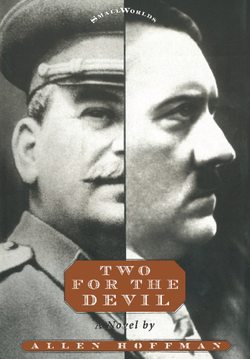Читать книгу Two for the Devil - Allen Hoffman - Страница 8
На сайте Литреса книга снята с продажи.
ОглавлениеI
ROYAL GARMENTS
If a king’s porphyra, royal purple garment, appears as merchandise in the market square, woe unto the seller and woe unto the buyer. Thus Israel is the royal purple garment in whom the Holy One is glorified for it is written “Israel in whom I (God) am glorified . . .” (Isaiah 49:3) and, consequently, if Israel becomes common merchandise, it is woe unto the seller and woe unto the buyer.
—Midrash Esther Rabba
MOSCOW
1936
ROSH HASHANAH
(THE NEW YEAR)
It is taught in the name of Rabbi Eliezer that the Sixth Day of Creation fell on Rosh Hashanah, the New Year. On that day Adam was created from the dust, was placed in the Garden, was commanded not to eat of the Tree, sinned, in the eleventh hour he was judged, and in the twelfth hour he was pardoned. The Holy One Blessed Be He said to Adam: Just as you stood before Me in judgment on this very day, Rosh Hashanah, and you were pardoned, thus in the future your sons will stand before Me in judgment on Rosh Hashanah and they, too, will be pardoned.
—Vayikra Rabba
Rabbi Yossi Bar Kazarta taught: The Holy One Blessed Be He said to them, since you entered in judgment before Me on Rosh Hashanah and went forth in peace, I consider you as if you are a new creation.
—Jerusalem Talmud, Tractate Rosh Hashanah
PATRIARCHS AND PROGENY
NEITHER YAAKOV MOSHE FINE BAUM, THE KRIMSKER Rebbe, nor Karl Marx, the social philosopher, ever visited Moscow. Both, however, engendered offspring who resided in the traditional capital of Russia.
Karl Marx, the father of scientific socialism, based his materialistic determinism on the critical dialectic. The critical dialectic taught that the interaction of antagonistic, dynamic forces leads to change, and these new developments in turn lead to further dialectic progress. By means of the dialectic, Marx had declared that the workers had nothing to lose but their chains.
Inheriting the mantle of leadership from Marx, in 1903 Lenin created bolshevism when he falsely declared the men of his party faction to be of the majority, the Bolsheviks, and the opposing faction to be of the minority, the Mensheviks. In 1917 Lenin led the Bolsheviks in the Great October Revolution, and Russia became the world’s first Communist-Marxist state. Tirelessly Lenin advanced the dialectic: since the workers had already lost their chains, he murdered the tsar.
Later, when Lenin lay ill, he warned the Communist party against Comrade Stalin, the general secretary. In spite of this, Stalin inherited power, and he, too, quickly employed the critical dialectic by declaring that Lenin had bequeathed the Marxist-Leninist-Bolshevik legacy to him.
As Lenin’s Bolshevik heir, Stalin continued the development of the critical dialectic; since the workers no longer had chains and the tsar had been murdered, Stalin demonstrated the virtues of a classless society: absolutely everyone except Stalin could be the enemy. Even the party itself was subject to bloody purges. As for the workers, Stalin imprisoned, tortured, and murdered them, and he did this in numbers that the tsar had never dreamed of, because with the critical dialectic, progress knew no limits!
By contrast, the Krimsker Rebbe’s only daughter, Rachel Leah Finebaum, knew very specific limits. In Moscow she lived in stagnant isolation in an armoire. Her husband, Hershel Shwartzman, a senior colonel in the Soviet secret police, the NKVD, did not have to be an expert practitioner of the critical dialectic to understand that the wife of his youth was quite literally the skeleton in his Marxist-Leninist-Bolshevik-Stalinist closet. And he knew about creating skeletons; Colonel Shwartzman worked to protect the world’s most progressive revolution in the world’s most Stalinist secret police prison, the Lubyanka.
The Lubyanka was both limited and limitless because of its sacred mission: to insure Stalinism. Like everything else in Stalin’s Soviet Union, the Lubyanka had a past as well as a present. Under Stalin, either or both could prove to be liabilities. The Lubyanka’s past certainly was an embarrassment, for it had been the home of a bourgeois insurance company.
